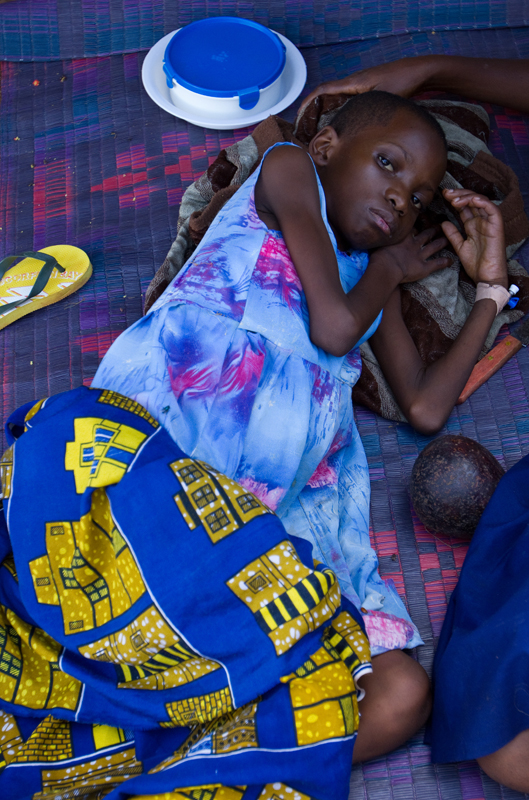Yesterday, I felt like I was really in Africa, not because I saw wild animals on a high-end luxury Safari, but because I was witness to some of the suffering on this continent.
After filming local artists at the university, we went to the children’s cancer wing at Mulago Hospital. They didn’t allow visitors (except family members) inside the one room ward but the door was open and we could see the conditions inside. The children’s ward, contained in its own small building was dimly lit and full to capacity. There were two rows of cribs and one row of beds with just enough room to move around. Parents were sitting with their children who were either sleeping or crying as painful procedures were done right inside the ward. I saw the horrified looks on children’s faces as they watched these procedures being administered to others, knowing they soon would be next. It was heartbreaking to see children so sick and knowing there was little hope for their future.
The children who were well enough to go outside were sitting with their mother or father underneath the shade of a tree,  too sick to do much more than quietly lay there on a blanket. Some were so thin they looked like fragile dolls. In Uganda, many of these ill children travel hundreds of miles from their villages, seeking medical attention, only to arrive and find out that not only is the cost of chemotherapy prohibitively expensive but the hospital provides nothing – not even food. So, many children are abandoned and die a slow death from starvation and the ravages of a cancer that literally multiplies at a daily pace.
too sick to do much more than quietly lay there on a blanket. Some were so thin they looked like fragile dolls. In Uganda, many of these ill children travel hundreds of miles from their villages, seeking medical attention, only to arrive and find out that not only is the cost of chemotherapy prohibitively expensive but the hospital provides nothing – not even food. So, many children are abandoned and die a slow death from starvation and the ravages of a cancer that literally multiplies at a daily pace.
This is what Letha Sandison witnessed when she first arrived in Uganda, accompanying her husband who is a doctor specializing in Malaria. She knew that most of the cancers that the children have are curable – if only they could get treatment and be nourished.  After spending many months volunteering at the hospital, she decided to do something more to help. She formed the Wrap Up Africa foundation, which is a combination micro business, and philanthropic outreach. She trained family members of sick children to be tailors and sew garments made from indigenous materials, thus creating a sustainable model that not only gave the families the resources to pay for their child’s treatment but also at the same time give them a trade and the means to help themselves.
After spending many months volunteering at the hospital, she decided to do something more to help. She formed the Wrap Up Africa foundation, which is a combination micro business, and philanthropic outreach. She trained family members of sick children to be tailors and sew garments made from indigenous materials, thus creating a sustainable model that not only gave the families the resources to pay for their child’s treatment but also at the same time give them a trade and the means to help themselves.
In the process, she has involved and employed local artists to make buttons for the garments and uses local mills to make the fabric used in the clothes. Her idea was to use local resources, rather than to import things from countries like China and India and at the same time create a sustainable business model that would bring income and hope to many in the process. She told me that it would have been easier to have just set up a cancer foundation and provide money for the treatments but her vision was to create something more than just a hand out.
The day before our visit to the hospital we went to Letha’s office where tailors were busy at work. When Letha entered the room, one young woman got down on her knees and said “Thank you for my little girl”. Letha explained that this young mother had a 5-year-old daughter who had a tumor on her kidney and was basically written off to die, but because her mother was able to pay for her chemo treatments, her daughter’s cancer went into remission and now the child is 6 years old and back in school. The mother continues to stay in Kampala with her daughter and sew for Letha so that her child can be monitored over the next few years and treated as necessary. Her village is too far away and the journey too lengthy and expensive to go back and forth, so like many others, they stay in Kampala, away from the rest of their families, hoping for the best.
I could see the look on Letha’s face when this young mother thanked her for giving her back her child and that was what kept her going. That is the reward that Letha receives and it far outweighs any monetary rewards that we all seem to get caught up in from time to time. And that is what motivates the people who choose to do what they can to make a positive difference.
Letha summed up living in Africa. She told me that living in Africa, you had strawberry days and onion days. The strawberry days are sweet and beautiful and fantastic and the onion days are days that make you cry and have layers of difficulty and hardship. There’s nothing easy about living in Africa, but the rewards are many.











